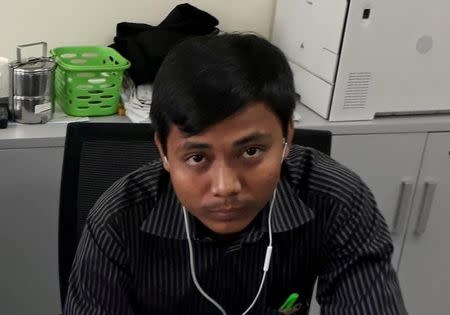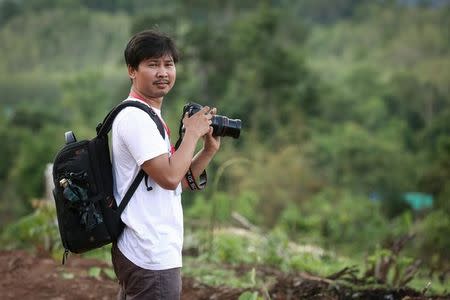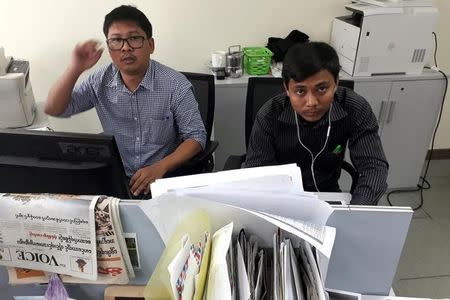Factbox: International reaction to arrest of Reuters reporters in Myanmar
(Reuters) - Several countries, the United Nations and journalist groups are demanding the release of Reuters reporters Wa Lone and Kyaw Soe Oo from detention in Myanmar.
The reporters were arrested on Dec. 12 after being invited to meet police officials on the outskirts of Yangon. They had worked on stories about a military crackdown in Rakhine state, scene of around 650,000 Rohingya Muslims fleeing to Bangladesh since late August.
Myanmar's Ministry of Information has said the reporters "illegally acquired information with the intention to share it with foreign media," and released a photo of them in handcuffs.
It said the reporters and two policemen faced charges under the British colonial-era Official Secrets Act, which carries a maximum prison sentence of 14 years, though officials said they have not been charged. Their exact whereabouts are not known.
"We and their families continue to be denied access to them or to the most basic information about their well-being and whereabouts," Reuters President and Editor-In-Chief Stephen J. Adler said in a statement calling for their immediate release.
"Wa Lone and Kyaw Soe Oo are journalists who perform a crucial role in shedding light on news of global interest, and they are innocent of any wrongdoing," he said.
Here are the comments on their detention from governments, politicians, human rights groups and press freedom advocates around the world:
LATEST REACTIONS
- Germany said on Wednesday it would push the Myanmar government for the release of the journalists. "We see press freedom as a cornerstone of a democratic order," the German foreign ministry said in a statement.
- Norway's foreign ministry also said the arrest of the two Reuters journalists was a matter of concern. "Norway expects the Myanmar authorities to ensure the full protection of their rights and to release the journalists as quickly as possible," Astrid Sehl, a spokeswoman for the Norwegian Ministry of Foreign Affairs, said on Wednesday in response a question.
- David Kaye, the U.N. special rapporteur for freedom of expression, said the arrest of the journalists was unacceptable.
"Journalists have the right to cover information and they shouldn't be arrested for coming into possession of information," he told Reuters on Wednesday.
GOVERNMENTS, MULTILATERAL ORGANIZATIONS
- U.S. Secretary of State Rex Tillerson said last week the United States was "demanding their immediate release or information as to the circumstances around their disappearance." On Tuesday, State Department spokeswoman Heather Nauert reiterated the U.S. demand for the reporters' immediate release.
- Republican Thom Tillis and Democrat Chris Coons, the leaders of the U.S. Senate Human Rights Caucus, said they were "gravely concerned" about the arrests of the Reuters journalists and that freedom of the press was critical to ensuring accountability for violence against the Rohingya. Democratic congressman Ted Lieu, a member of the House of Representatives Foreign Affairs Committee, called the arrests "outrageous and a direct attack on press freedom."
- Japanese Foreign Minister Taro Kano said in response to a question from a Reuters reporter on Tuesday: "Freedom of the press is extremely important, including in order to protect fundamental human rights. The Japanese government would like to watch (this matter) closely." A Tokyo-based non-governmental organisation, Human Rights Now, called on the Japanese government on Wednesday to take a stronger stance.
- The European Union urged Myanmar on Monday to release the two Reuters reporters "as quickly as possible." A spokeswoman for the EU's foreign affairs chief Federica Mogherini said, "Freedom of the press and media is the foundation and a cornerstone of any democracy."
- U.N. Secretary-General Antonio Guterres said countries should do everything possible to secure the journalists' release and freedom of the press in Myanmar. Guterres said, "It is clearly a concern in relation to the erosion of press freedom in the country."
- The governments of Britain, Holland, Canada and Sweden have also demanded the release of the Reuters reporters. Australia has expressed concern and Bangladesh has denounced the arrests.
- Vijay Nambiar, a former special adviser on Myanmar to the U.N. Secretary-General, said in a statement to Reuters on Monday that the detentions had caused "widespread disappointment within and outside the country that is likely to further damage the international reputation and image of Myanmar, already under stress as a result of its handling of the Rakhine crisis."
- President of the European Parliament Antonio Tajani called on Myanmar to protect media freedoms and release the two reporters.
JOURNALISTS, NGOS
- The International Commission of Jurists (ICJ) called on Myanmar authorities to immediately disclose the whereabouts of the pair. "All detainees must be allowed prompt access to a lawyer and to family members," Frederick Rawski, the ICJ's Asia-Pacific Regional Director, said in a statement on Monday.
- The Committee to Protect Journalists said the arrests were "having a grave impact on the ability of journalists to cover a story of vital global importance".
- The Paris-based Reporters Without Borders said there was no justification for the arrests and the charges being considered against the journalists were "completely spurious".
- Advocacy group Fortify Rights demanded the Myanmar government immediately and unconditionally release the two Reuters journalists.
- Myanmar's Irrawaddy online news site called on Dec. 14 for the journalists' release in an editorial headlined "The Crackdown on the Media Must Stop." The newspaper said that "it is an outrage to see the Ministry of Information release a police record photo of reporters handcuffed – as police normally do to criminals – on its website soon after the detention. It is chilling to see that MOI has suddenly brought us back to the olden days of a repressive regime."
- The Southeast Asian Press Alliance said the two journalists were "only doing their jobs in trying to fill the void of information on the Rohingya conflict."
- The Protection Committee for Myanmar Journalists, a group of local reporters who have demonstrated against past prosecutions of journalists, decried the "unfair arrests that affect media freedom".
- The Foreign Correspondents' Club of Myanmar said it was "appalled" by the arrests and "gravely concerned" about the state of press freedom in Myanmar.
- The Foreign Correspondents' Club in Thailand, The Foreign Correspondents' Association of the Philippines, the Jakarta Foreign Correspondents' Club and the Foreign Correspondents' Club of Hong Kong have also issued statements of support for the journalists.
(Compiled by Raju Gopalakrishnan)




